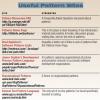|
|
How to Survive the Software Swamp For a project to make long-term progress, it must build a platform of basic engineering practices. On this platform are set the ladders of advanced techniques that you select using risk analysis. Properly managed, these processes help you avoid falling back into the swamp whenever the project is under pressure.
|
|
|
|
Quality Assurance and Testing Brian Marick argues for using testers at the requirements analysis stage of a project. He says, "While QA is primarily about process, testing—my specialty—is about product. Whatever else a tester might do, she certainly eventually exercises the product with the aim of discovering problems a user might encounter. This essay is about that 'whatever else' the tester does."
|
|
 |
A Look at Rational SQA Robot Noel Nyman continues sharing his experiences of working in the Microsoft WindowsNT Group, where he evaluated several automation tools for the Applications Test team. This is the second installment in a series.
|
|
 |
Normal Processes Using a sociological theory as his starting point, Technical Editor Brian Marick shows how sometimes systems can encourage local problems to blossom into system-wide catastrophes.
|
|
 |
Finding Patterns in Software "Patterns" have caught on among software designers, especially those working on object-oriented systems. More recently, patterns have been applied to organizational behavior, including patterns for organizing independent test groups. Brian Marick provides Web resources on the study of patterns.
|
|
|
|
Big Ball of Mud Much of recent systems theory revolves around applying ideal software development patterns. Big Ball of Mud, in contrast, is for those of us who live and work in the real world, where most systems emerge haphazardly from minimally controlled chaos under constrained development conditions. Bar Biszick recommends and describes the Big Ball of Mud Web site.
|
|
|
|
Interviewing Your Interviewer Job interviews are stressful. Often, people are so eager to impress the interviewer that they don't find out critical information about the company and the position. But it's just as important for you to be convinced of the position's suitability for you as it is for the company to be convinced of your suitability for the position. If you ask the right questions, interviews can be much more productive at helping you avoid poorly managed, unhappy projects and zero in on well-run, professional projects.
|
|
|
|
Book Review: Mastering the Requirements Process Brian Lawrence points to Mastering the Requirements Process as a valuable reference book. The book presents a complete step-by-step method for gathering, modeling, and specifying requirements. Along the way the authors offer easy-to-understand and appropriate examples that nicely illustrate how to apply their techniques.
|
|
|
|
Managers Are Just for Budget Cutting, Right? Luisa Consolini tells us why the managerial side of quality is as important as the technical side. The precepts she imparts are: 1) there is something as bad as not doing testing—not managing it; 2) if you don't manage quality, you won't improve it just by applying some fancy quality techniques; and 3) people are not second to quality.
|
|
 |
Heuristic Test Oracles For automated testing, expected results are generated using a test oracle. Here is a look at how heuristic oracles can strike a balance between exhaustive comparison and no comparison at all.
|
|
